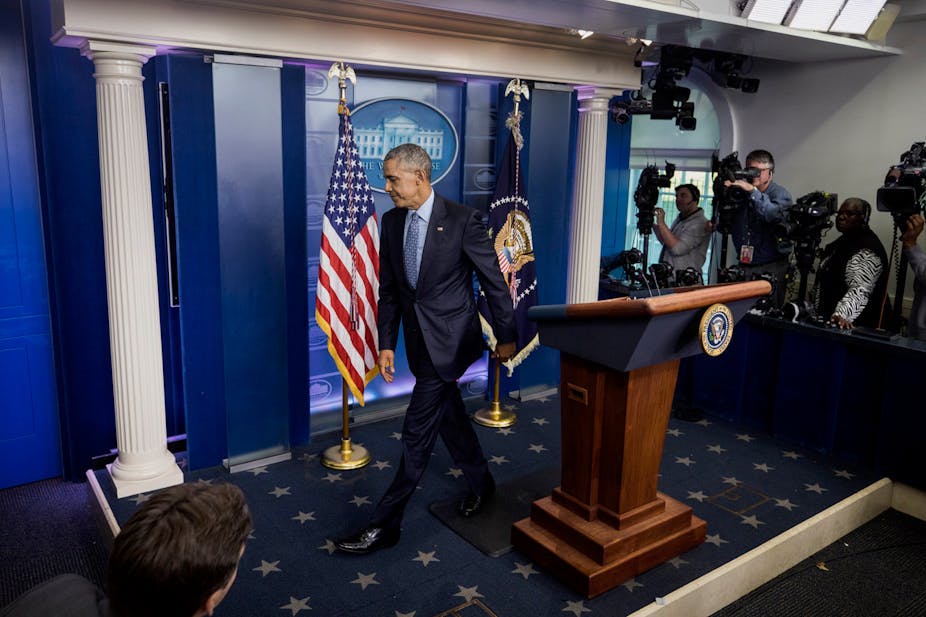Chelsea Manning, the US army whistleblower who was sentenced to 35 years for leaking sensitive documents to WikiLeaks is being released after a pardon by Barack Obama, issued during his last days as president. She entered prison as Bradley Manning but, after being diagnosed with gender dysphoria in 2013, will emerge into a new US under a new president as Chelsea.
Nearly four months into the Trump presidency, it is timely to review the extent to which US security policy has changed; and whether the release of Manning is in itself any indicator. The degree to which the incoming president was anticipated to significantly change his country’s security policy was, arguably, unprecedented. President Trump’s opponents foresaw large-scale change (for the worse) while his supporters anticipated radical (and in their view positive) change. The result to date: far less than either side might have imagined.

Let us examine a number of issues. The most high-profile initial action sought to “secure” the US from the threat of extreme Islamic terrorism through an executive order which imposed a temporary ban on immigration from seven Muslim countries. Not only were the measures dismissed on legal grounds, but the extent to which they might have been effective is also questionable.
Some within the US leadership might have believed that these measures would add to the country’s feeling of – if not actual – security, but this has to be balanced against the wider issues that affect Ammerica’s national security.
The US is a major trading nation and, particularly in the fields of high technology and arms sales, the global leader. The very region that the travel ban might have impacted, the Middle East, is a major purchaser of American military hardware.
It is also in the interests of the US for the Middle East to be stable – not least, for reasons of national security – so it needs to remain engaged in the region in order to be able to apply influence. America’s lack of involvement in Syria is a clear example: not only has this allowed Russia to dominate the local, and to an increasing extent regional, debate, but the chances of there being any settlement that would be in America’s broader interests are significantly decreased.
Put simply, America remains a trading nation and a global superpower. Isolationism of any form will simply not advance its interests, and president Trump, as both a businessman and a realist, will be aware of this – or at least be becoming aware.
Meanwhile, the president’s suggestions of a closer relationship with Putin’s Kremlin show few signs of being translated into action, notwithstanding the ongoing domestic investigations into alleged involvement of Russia in the presidential election. This reflects a greater degree of continuity in American security policy than might have been anticipated.
Likewise, the lack of real progress in the construction of the border wall with Mexico suggests that realpolitik is exerting a greater hold over the creation and direction of US foreign and security policy than campaign promises.
While there have been new levels of rhetoric in foreign policy, particularly where there is a significant and direct security element, what is more significant is the consistency. An examination of the administration’s response to the North Korean missile tests reveals greater and harder rhetoric, with threats and demonstrations of power, and a greater reaching out to China. But is this really that different from the Obama era?
Obama, like Trump, recognised both the regional and wider security threats that a potentially nuclear – and ballistic missile – capable North Korea represents. The only difference between them appears to be their respective enthusiasm for the Roosevelt doctrine of “speak softly, and carry a big stick”. Obama was more willing to speak softly, but both acknowledge the need for the big stick. Indeed, the differences are arguably more of approach than substance.
But what of domestic policies and how these affect security policy? Again, there is more consistency than was first imagined.
Gun law (Obama’s greatest regret was failing to better control firearms) shows little chance of changing, and the closure of mosques is as unlikely now as it was 100 or more days ago, when Trump entered office. And despite changes in senior appointments within national security agencies and the White House, it is unlikely this will lead to significant change in internal American security policy.
So where does the release of Manning fit into all this? President Trump denounced Obama’s decision to offer Manning the clemency that will lead to her serving seven years of her 35-year sentence. But it was a decision he was unable to overturn.
It is possible, probable even, that there will be negative, provocative even, 2am tweets from the Oval Office, but the release will go ahead. The debate about whether Manning should have received a full pardon (the liberal viewpoint) or is a traitor (the conservative viewpoint) will continue but changes as a result of the WikiLeaks affair are as unlikely under this president as under his predecessors: the move to a fully open government and society as proposed by the adherents of WikiLeaks just has not happened. President Trump has been vocal in his criticism of WikiLeaks. Internal US security policy will likely mimic the lack of change in external policy. To put it bluntly, wider national interests will be seen to be best served by a broad continuation of present security policies.
There have been changes in US security policy, but more in the rhetoric than the substance. Promising significant change while on the campaign trail is one thing, but faced with a “far tougher than I imagined” job, overriding national needs, and the realities of global politics, Trump is struggling to enact real and significant change. Be prepared for more bluster (it is this president’s style) but few changes of true significance.

